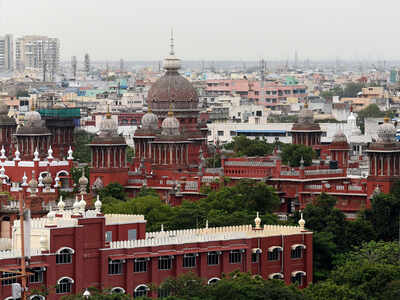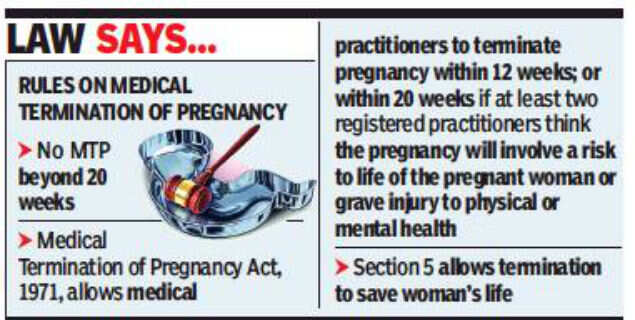
CHENNAI: The Madras high court has allowed the termination of a woman’s 26-week pregnancy after medical tests revealed that the fetus had health complications and the child would require multiple and extensive surgeries with a remote chance of survival.
The Trichy woman moved the court seeking permission to terminate the pregnancy after the legally permissible gestation time of 20 weeks. Scan reports during the 18th week of her pregnancy revealed that the fetus seemed to have dilated ventricles — a brain condition.

On advice of doctors, the woman underwent tests again after two weeks, which revealed that the fetus had ‘severe congenital defects’ and the growth was becoming worse day by day. The woman was advised by two different doctors to terminate the pregnancy as soon as possible.
She told the court that she is willing to undergo any further medical tests or consultation before any medical board that may be constituted by the courts and also stated that her husband, who is living in France, is willing to give his consent for the abortion.
The court, subsequently directed her to appear for a medical examination at the Tuticorin Government Medical College Hospital, where a medical board comprising a paediatrician, neurosurgeon, neurologist, cardiologist and obstetrician assessed her previous medical reports and subjected her to various tests and filed a report before the court.
The medical board was of the unanimous opinion that the woman should be allowed to abort the fetus.
“When the medical board has given an expert opinion suggesting that the growth of the fetus is either very weak or it is confronting several medical anomalies, and has recommended to abort the fetus, this court cannot ignore the recommendations,” a division bench of Justice R Subbiah and Justice C Saravanan said. The bench cited the medical expert’s opinion and said, “Even if the child in the womb is born, its survival will be medically remote as it has to confront numerous surgeries, which cannot assure its longevity.” In such circumstances, if the pregnancy is not ordered to be terminated, the woman would be subjected to mental trauma and hardship, the court ruled.
The Trichy woman moved the court seeking permission to terminate the pregnancy after the legally permissible gestation time of 20 weeks. Scan reports during the 18th week of her pregnancy revealed that the fetus seemed to have dilated ventricles — a brain condition.

On advice of doctors, the woman underwent tests again after two weeks, which revealed that the fetus had ‘severe congenital defects’ and the growth was becoming worse day by day. The woman was advised by two different doctors to terminate the pregnancy as soon as possible.
She told the court that she is willing to undergo any further medical tests or consultation before any medical board that may be constituted by the courts and also stated that her husband, who is living in France, is willing to give his consent for the abortion.
The court, subsequently directed her to appear for a medical examination at the Tuticorin Government Medical College Hospital, where a medical board comprising a paediatrician, neurosurgeon, neurologist, cardiologist and obstetrician assessed her previous medical reports and subjected her to various tests and filed a report before the court.
The medical board was of the unanimous opinion that the woman should be allowed to abort the fetus.
“When the medical board has given an expert opinion suggesting that the growth of the fetus is either very weak or it is confronting several medical anomalies, and has recommended to abort the fetus, this court cannot ignore the recommendations,” a division bench of Justice R Subbiah and Justice C Saravanan said. The bench cited the medical expert’s opinion and said, “Even if the child in the womb is born, its survival will be medically remote as it has to confront numerous surgeries, which cannot assure its longevity.” In such circumstances, if the pregnancy is not ordered to be terminated, the woman would be subjected to mental trauma and hardship, the court ruled.
World Cup 2019
Trending Topics
LATEST VIDEOS
More from TOI
Navbharat Times
Featured Today in Travel
Quick Links
Lok Sabha Election Schedule 2019Lok Sabha Election NewsDelhi Capitals teamMI team 2019Rajasthan Royals 2019RCB team 2019Maharashtra Lok Sabha ConstituenciesBJP Candidate ListBJP List 2019 TamilnaduShiv Sena List 2019AP BJP List 2019Mamata BanerjeeBJP List 2019 MaharashtraPriyanka GandhiBJP List 2019 KarnatakaAMMK Candidate List 2019BJP List 2019 WBLok Sabha Elections in Tamil NaduBSP List 2019 UPNews in TamilLok Sabha Poll 2019Satta Matka 2018PM ModiMahagathbandhanNagpur BJP Candidate ListChandrababu NaiduTamil Nadu ElectionsUrmila MatondkarNews in TeluguMadras High CourtTejashwi YadavArvind KejriwalTejasvi SuryaPawan KalyanArvind KejriwalYogi AdityanathJaya PradaSatta King 2019Srinagar encounter
Get the app









